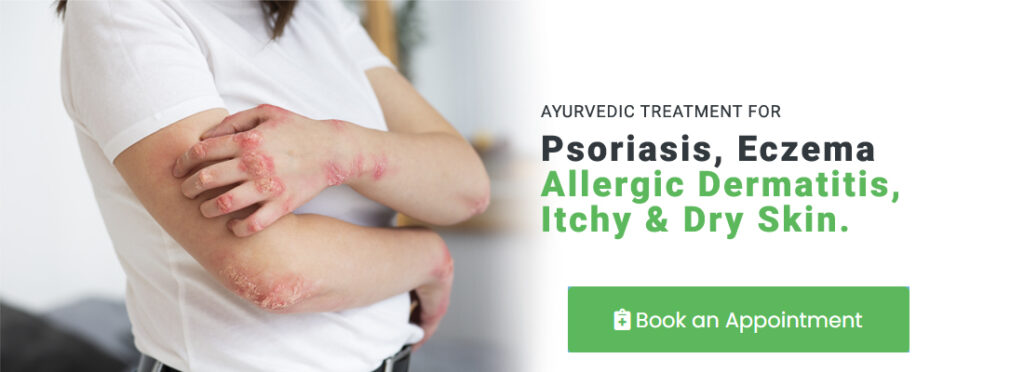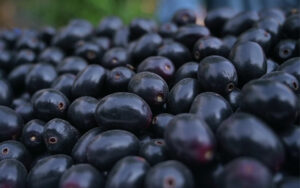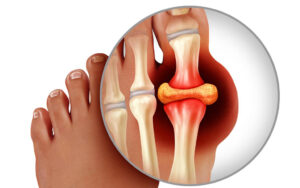
Ayurvedic Treatment for Psoriasis
Psoriasis is a common skin condition in which skin develops areas that become thick covered with silvery scales. and millions of people are suffering from Psoriasis. Psoriasis is an autoimmune disorder of the skin results in hyper proliferation of the skin. and genetic and environmental factors have a significant role in this. Psoriasis is a non-contagious, dry, inflammatory and ugly skin disorder, which can involve entire system of person.
It usually starts in the scalp, below the knees or elbows or in the back of the ears. Usually it is confused with dandruff until the specialist confirms it as psoriasis. The most commonly affected sites are the scalp, tips of fingers and toes, palms, soles, umbilicus, gluteus, under the breasts and genitals, elbows, knees, shin etc. It is an Important disease in consideration to its treatment as mostly difficult in other pathies but can be easily treated and managed in Ayurveda.
Psoriasis according to Ayurveda
Kiṭibha of Ayurvedic literature is compared and accepted with Psoriasis of Modern Medical diagnosis. Psoriasis (Kiṭibha) is well known disease in Ayurvedic fraternity from the time immemorial. A clear disease description is available in Caraka samhita. This disease description along with its pathogenesis, treatment etc. are well defined in Ayurveda
Psoriasis is mostly comparable with two varieties of kshudra kustha ie. Eka kustha and Kitibha kustha and also with a variety maha kustha / Sidhma kustha.
Types of Psoriasis
Some Common types if Psoriasis are
- Psoriasis vulgaris
- Plaque psoriasis
- Guttate psoriasis
- Inverse psoriasis
- Pustular psoriasis
- Erythrodermic psoriasis
- Scalp psoriasis
- Nail psoriasis
- Psoriatic arthritis
- Oral psoriasis
- Eruptive psoriasis
Causes of Psoriasis
- Diet plays an important role in this particular disease.
- Intake of mutually contradictory food like fish and milk, intake of unctuous and heavy drinks, suppression of natural urges like vomiting, sleep, thirst.
- Physical exercise in excess heat climate or after taking heavy meal, exposing to heat, cold, fasting and taking food.
- Intake of cold water immediately after exposing to sun.
- Intake of uncooked food and food before the previous meal is digested.
- Violation of laws of Panchakarma (5 purification procedures).
- More intake of foods like fresh grains, curd, fish, salt and sour substances.
- More intake of black gram, radish, pastry, sesame seeds, milk, jaggery etc.
- Sexual act in the state of indigestion; day sleep, performing sinful acts etc.
Symptoms can be seen in two conditions
1) Prodromal features of Psoriasis [Purvarupa of Eka kushtha]
- Reduced perspiration (Aswedan)
- Increased perspiration (Atiswedan)
- Discoloration of the skin(Twak vaivarnya)
- Itching(Kandu)
- Pricking sensation(Nistoda)
- Numbness(Suptata)
- Horripilation(Lomaharsha)
- Fatigue (Klama) etc.
2) Clinical features of Psoriasis [Rupa of Eka kushtha]
- Blackish brown discoloration of skin (Śyāvaṁ)
- Affected skin will be rough to touch like the scar tissue (Kiṇa khara sparśa)
- Hard to touch (Pourash)
- Reduced sweating (Asweda)
- Extended skin lesions (Mahavastu)
- Scaling of skin similar to the scalesof the fish (Matsya shakalopama)
- Pink discolouration (Aruna varna)
- Blackening of the part (Krishna varna)
Psoriasis treatment in Ayurveda
Psoriasis can be very well treated in Ayurveda. Treatment is done keeping following factors in mind
- Prakruti of the patient
- Dosha dominance in disease
- Dosha vitiation
- Obstruction in srotha
- Manasika Prakriti
- Ahara and Vihara
- Hereditary factors
So depending on all these above factors a line of treatment can be finalized. A common line of treatment for Psoriasis includes
- Detox using Panchakarma – Vaman or Virechan or both are recommended one after the other
- Ghritapana – Oral administration of medicated Ghee
- Medicines – Both Internal and External Medicine are used
- Diet – Strict Diet to be followed by patient
- Yoga asana, Pranayama & Meditation helps in quick recovery



